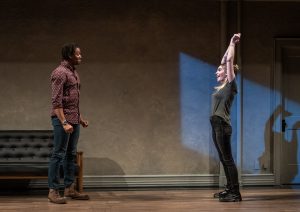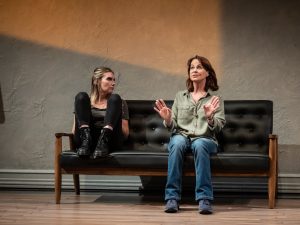La Jolla Playhouse Premiere: Finding a Team to Deal With Death
Death, obviously inevitable, arrives on assorted time-tables, from sudden and unexpected to gently and long anticipated. Though personal preference is rarely a factor, medical science sometimes offers an informed choice.
Lisette, in Melissa Ross’s new play The Luckiest now premiering at the La Jolla Playhouse, is one of those burdened with a preview: Her illness is untreatable, deteriorating at a predictable rate and inevitably fatal.
It’s time for some choices.
Life is such a joy for Lisette that she hasn’t found time or need for a partner. Now, with the days dwindling down, she’ll require at least help before the choices slip from her failing grasp. Her mother, she feels, is just as alone and needy as she is herself. And there are no romances in sight.
Then she meets this guy at a party. As they talk, the bonds grow, even though he’s there to cruise another guy and she’s already on an entirely separate schedule. They flow together into a potential team. She can decide to invite all her friends to a final party in Vermont, where euthanasia is legal. He’ll be there to the end.
There’s no suspense, no surprise ending. This is Death we’re dealing with, both victim and survivors. She pops the question. He must decide to put aside his own life for as long as it takes. The rewards for each of them are vague but conclusive.
It’s a brief, tightly-wound, stripped-down play, a half dozen or so scenes scattered at seeming random, packed with gallant tenderness, edging away from sentimentality and devoid of the lachrymose. The central dilemma, familiar from countless variations, is peeled of decorative detail and allowed to vibrate unhindered: the victim, the chosen helper and the helper spurned.
Aleque Reid, lean, lithe and dynamic, is a tonic as Lissette’s healthy self and later a collapsing ideal of courageous fortitude in her sad decline. His character’s own life in limbo, Reggie D. White strains to hold Lissette for life as long as possible, unpacking a bottomless supply of chips and dips from Trader Joe’s for that last party and then helping her into that prom dress. Deirdre Lovejoy, representing an infinity of parents being left behind to despair, finds vast depths of feeling in a line as simple as: “Call me on holidays? I wouldn’t mind.”
Ross is exquisitely attuned to the ethos of our era, with its roiling emotions and nervous stresses stuffed under cool veneers of efficiency. When and where the cracks in her story happen makes sense; both past and future are plausible. She’s yet another of a writing generation that bodes well for the theatre.
Jaime Castaneda’s unobtrusive staging is suave and sympathetic, even on the oddly widened stage which doesn’t work despite Tim Mackabee’s intelligent set design and Lap Chi Chu’s nimble area lighting. (Plus, what’s with the balcony stretching the width of the stage but never used except as a lighting baffle? Looks like scenery from some other show.) Denitsa Bliznakova finds her usual appropriate wardrobe for the occasion.
A play from decades ago on a similar subject comes to mind– Brian Clark’s Whose Life Is It Anyway? – as a contrast between eras. That one, quite successful in various versions for stage, screen and television, was deeply involved with the morality and legality of euthanasia. Melissa Ross ignores such matters to concentrate instead on the personal impact of the situation.
I’ll call that progress.
(Continues in the La Jolla Playhouse’s Potiker Theatre on the UCSD campus at 7:30 p.m. Tuesdays and Wednesdays; at 8 p.m. Thursdays-Saturdays; and at 2 p.m. Saturdays and Sundays through July 28, 2019.)

Welton Jones has been following entertainment and the arts around for years, writing about them. Thirty-five of those years were spent at the UNION-TRIBUNE, the last decade was with SANDIEGO.COM.




